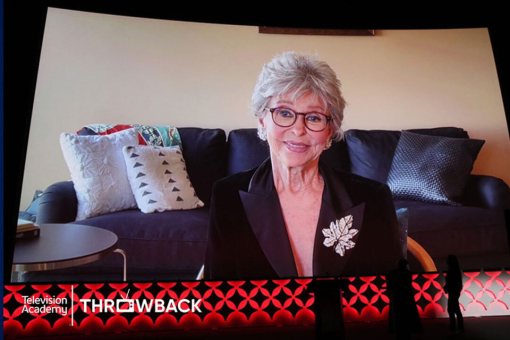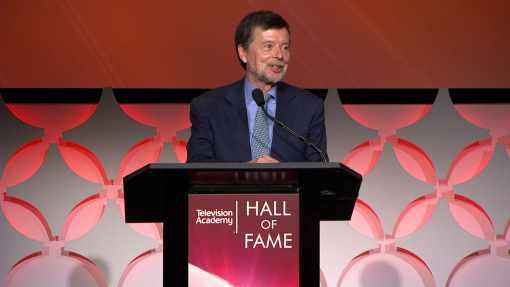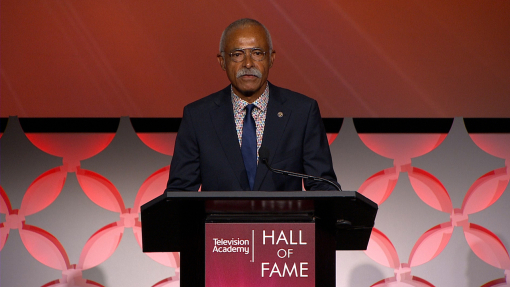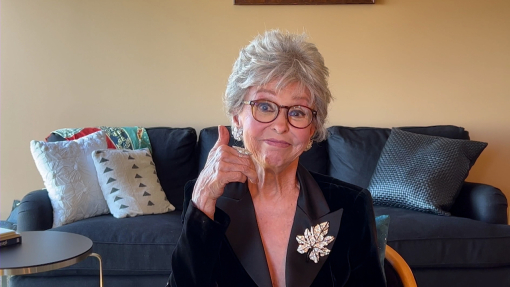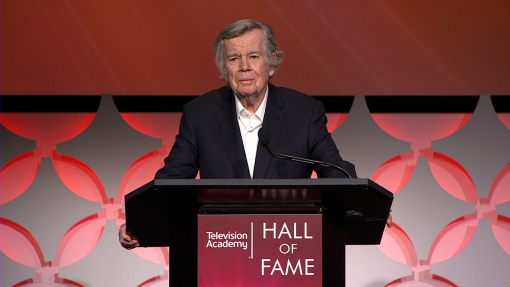“The turning point in my life happened when I was 13 years old,” remembers Dick Clark, the host and/or producer of American Bandstand from 1956 to 1989, more than 250 specials, series, awards programs, music and game shows, and television movies. “I went to a CBS radio broadcast in New York with Garry Moore and Jimmy Durante. I was mesmerized. It was exciting and exhilarating. I knew then that I wanted to be in broadcasting. Not many people at 13 are lucky enough to have an idea about what they are going to end up doing.”
Born in 1929 in Bronxville, New York, Clark graduated from Syracuse University and made his television debut in Utica, New York, during the summer of 1951 as a local news anchor. “I guess there are people who are supposed to do certain things,” Clark observes. “I don’t have any problem talking to a television camera or a microphone. Right from the start, the reaction to what I was doing was very positive and extraordinarily complimentary. People bought what I was doing, and I figured that if I could do it in Utica, I ought to be able to do it in a larger market.”
In 1952, Clark began working for WFIL radio and television in Philadelphia. Four years later, he began hosting a local daily daytime music program called Bandstand. At the same time, he also began his career as a producer. Forming dick clark productions, Clark put out five, 90-minute programs each week on a $1,500 budget, including talent fees.
The following year, ABC picked up for network broadcast the renamed American Bandstand, and within a few months it became the highest rated daytime program. The program went on to set a Guinness record as the longest running entertainment program.
Nearly 40 years later, Clark has become one of television’s best-known personalities. He holds the distinction of simultaneously hosting a program on all three networks and in syndication.
Clark’s programs include: The American Music Awards, The Academy of Country Music Awards, The Soap Opera Awards, The Daytime Emmy Awards, The Golden Globe Awards, Live Aid, Farm Aid, The CableACE Awards, Dick Clark’s New Year’s Rockin’ Eve, Miss Universe, Miss Teen USA, Miss USA, the Pyramid series of game shows, the Bloopers and Practical Jokes series and specials, as well as 34 series and more than two dozen television movies. The latter includes The Woman Who Willed a Miracle, the winner of four Emmys and a George Foster Peabody Award.
“Nobody thinks about a job as sentimentally and as personally as I think about American Bandstand," Clark says. “It is the whole basis of my professional life. It made all of my childhood dreams come true. American Bandstand gave me a foundation upon which to branch out and not worry. I had enough money coming in so I could keep body and soul together. It was steady for 33 years in a very temporary world. That’s extraordinary good fortune.”
Clark says that there is a technical skill behind his personable persona. Looking back on his start, he says, “I talked to the camera then almost exactly the way I do it now. The delivery, the communication, is virtually the same.”
In 1959, Clark was called to testify before the Congressional committee investigating the payola scandal in the music business and emerged unscathed after close questioning. “It almost killed me because I was very, very young,” Clark remembers. “It was a witch hunt, but I’ve always believed that the good guys win.”
Leonard Goldenson, the founder of ABC and himself a Hall of Fame Honoree, recalls that “Clark always had a very clean show that appealed to the young. He had a wholesome look and conveyed that very definitely on television. He always handled himself as a real gentleman. Most of the teenagers of the country grew up with him over the 20-year period. He was a household word as far as teenagers were concerned, and he hasn’t changed a bit since then. He still looks like the Dick Clark of 25, 30 years ago.”
Goldenson remarks that Clark naturally extended his American Bandstand popularity as he and his audience matured. “We used him on a number of specials,” Goldenson remembers, “and he really graduated from teenage shows to specials that appeal to the adult audience. A number of the young people who had watched him as teenagers were young mothers and wives when these specials came on, and they followed him. He always handled his shows with great taste and ability. Basically, he has handled himself beautifully.”
Dick Ebersol, now president of NBC Sports, recruited Clark in 1977 to produce several specials for that network. Many of the shows that Clark is now connected with at NBC, including the Bloopers and Practical Jokes series, grew out of that association.
Ebersol says, “I have always believed that Dick is one of the best television producers in Hollywood. He knows how to get things done well, quickly and in a very successful, businesslike manner. Some people thought that Dick’s talents were limited to music. But if you knew him well, you could see he had taste well beyond music that reflected what the public wanted to see.
“Few people in Hollywood are able to maintain that ability for more than five or 10 years at a stretch. Dick is a guy who has been at the top of his game for three decades. With Dick, somehow everything or other comes back to work. If he’s not producing a show, he’s taping a show that he’s in, and the perfect world for Dick Clark contains a woman who shares those interests as intensely and as passionately as he does. That is why it is so wonderful that Dick is married to Kari. They’ve been together since 7/7/77. It’s impossible to forget their anniversary.”
Today, dick clark productions is a publicly traded company with interests in television, theatrical motion pictures, music, videos, syndication, and radio networks. Clark has also organized a television-music archive.
“Bandstand was a formidable information-gathering opportunity for me,” Clark says, “so I began to prepare a second life and wait for the day that I would be dismissed from American Bandstand or retired or whatever. I wanted to be able to say, ‘The heck with that! I have something else to go to.’ I wanted to be involved in more than being in front of the camera because that was temporary, and I had to have a fall-back position. I wanted to be a producer, but not with a vanity production company.
“I studied business administration in college and knew that you learn a business as you stay in it: the personalities, the deals, how much the traffic will bear, how to survive, how to look down the road and see what people will be doing in the future.”
Clark is particularly proud of his company’s profitability in today’s competitive economy. “We have always run dick clark productions very, very modestly and conservatively," Clark says, “because you don’t take a lot of risks in a risk business. People criticized us for running a very tight ship. Some even called it ‘miserly.’ We didn't waste money. People used to scoff, but now they say, ‘How the devil do you do it?’ Our approach has proven to be very much in vogue now. These days, one of the first things you do is look at the budget and how you’re going to spend it. In the old days you created the idea and worried about the budget later. We never did that.
“The fun part is that there is always so much to do that you haven’t done before. There are so many things I would like to do. I never want to stop. There are too many challenges still left, and what is happening in communications is explosive.”
This tribute originally appeared in the Television Academy Hall of Fame program celebrating Dick Clark's induction in 1993.

